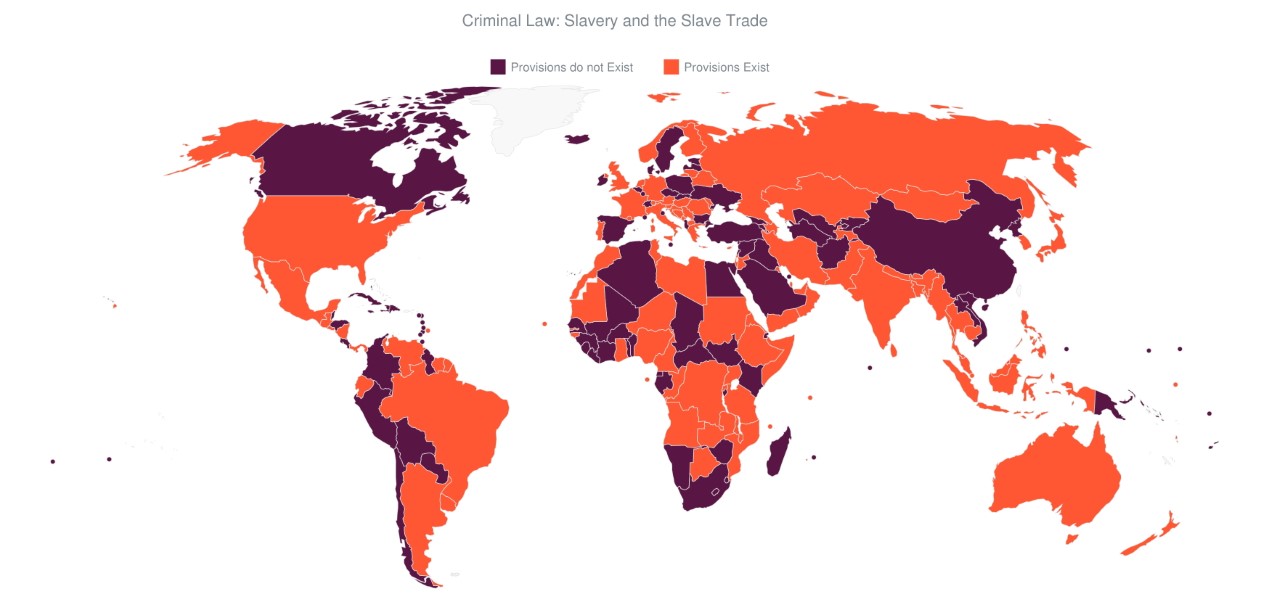Wednesday, 12 February 2020
A new global review of antislavery legislation has busted a popular misconception that slavery is now illegal in every country in the world.
The Antislavery in Domestic Legislation Database has been compiled over the past five years and is launched today at the United Nations headquarters by the University of Nottingham’s Rights Lab in partnership with the Castan Centre for Human Rights (Monash University, Australia).
The research reveals that, although legal ownership of people was abolished in all countries worldwide over the course of the last two centuries, it appears that almost half of all countries in the world (49%) have yet to make it a crime to enslave another human being. The database shows that in 94 countries, you cannot be prosecuted and punished in a criminal court for enslaving another person.
A report summarising the contents and findings of this extensive and pioneering research is calling for governments worldwide to take action to review their legislation and create new laws or rewrite existing legislation to completely outlaw slavery and other exploitative practices.
The Antislavery in Domestic Legislation Database is a publicly available and easily accessible resource aimed at improving legislation against slavery in every country in the world through evidence-based advocacy. It maps all 193 United Nations member states’ domestic legislation against their international treaty obligations related to modern slavery. Using evidence from over 700 domestic statutes, the database examines whether countries’ laws allow criminal prosecution in all categories of modern slavery, including slavery and the slave trade, forced labour, institutions and practices similar to slavery, servitude, and human trafficking.

Although 96% of all these countries have some form of domestic anti-trafficking legislation in place, many of them appear to have failed to ban specific types of human exploitation in their domestic law. Highlights of the research include the following findings:
- 94 states (49%) appear not to have criminal legislation prohibiting slavery
- 112 states (58%) appear not to have to put in place penal provisions punishing forced labour
- 179 states (93%) appear not to have enacted legislative provisions criminalising servitude
- 124 states (64%) appear to have failed to criminalise even one of the four institutions and practices similar to slavery outside of the context of human trafficking.
 Dr Katarina Schwarz, Rights Lab, University of Nottingham
Dr Katarina Schwarz, Rights Lab, University of Nottingham
Rights Lab Associate Director at the University of Nottingham, Dr Katarina Schwarz, created the database in partnership with Professor Jean Allain and launched the database today in New York. She said:
“It will surprise many people to learn that in all of these countries there are no criminal laws in place to prosecute, convict and punish people for subjecting people to the most extreme forms of exploitation. Abuses in these cases can only be prosecuted indirectly through other offences — such as human trafficking — if they are prosecuted at all. In short, slavery is far from being illegal everywhere and we hope our research will move the conversation beyond this popular myth.
“The database does not focus on naming and shaming particular countries, but on highlighting how widespread the gaps are globally in states’ domestic legislation prohibiting human exploitation. We have shown that national engagement with current international law on human exploitation has been erratic, irregular and incomplete. If we want to make the global commitment to eradicating slavery and exploitation a reality, we need to take this first fundamental step of recognising that many countries’ laws have still not addressed these practices.
“For nearly 90 years (from 1926 to 2016), it was generally agreed that slavery, which was understood to mean legal ownership of another person, could no longer occur because states had repealed all laws allowing for property rights in persons. The effective consensus was that slavery had been legislated out of existence. So, in many countries the thinking went; if slavery could no longer exist, there was no reason to pass laws to prohibit it.
“But this has changed since international courts have affirmed that the definition of slavery includes situations where the powers associated with ownership are exercised over a person, even absent laws permitting slavery. Combined with international laws explicitly requiring criminal laws against slavery and other exploitative practices, this new understanding of slavery means that it is not enough for countries just to abolish laws allowing slavery. States must proactively prohibit these practices through their criminal laws.
“Legislation is the gateway for engaging the machinery of the State as a whole in the fight against modern slavery—from high-level government officials to police officers and labour inspectors. Without effective laws in place, avenues for redress and recovery for victims and survivors are shut off, and responses may be partial or ineffective at addressing the full range of exploitation offences.
So, we are calling on governments all over the world to use our database to review their legal provision for prosecution and punishment of the people perpetuating slavery in all its forms in the 21st century, and to begin the process of reform to ensure their laws effectively address each of these extreme forms of human exploitation.”
 Professor Jean Allain, Castan Centre for Human Rights Law, Monash University
Professor Jean Allain, Castan Centre for Human Rights Law, Monash University
Professor Jean Allain, from the Castan Centre for Human Rights at Monash University, said:
“We have found that countries with criminal provisions, and those without, come from every region in the world and there is no single region performing substantially better than others across the board. However, there is variation between regions in the implementation of domestic legislation relating to each form of exploitation, and in the approaches taken to prohibition.
"Many commentators suggest that implementing legislation to address trafficking in persons sufficiently meets the need to criminalise the other forms of human exploitation considered in the database. However, the specific definition of trafficking as enshrined in both international law and domestic legislation runs contrary to its use as a ‘catch-all’ offence for various exploitative practices.”

https://antislaverylaw.ac.uk/resources/summary-of-findings/
The report produced for the launch of the database points out that the last systematic attempt to gather domestic laws on slavery was published over 50 years ago. Not only is this review now outdated, it says, the definition of slavery it tested against –slavery under legal ownership – has been thoroughly displaced with the recognition in international case-law that a person can, in fact, be held in the condition of slavery. This means that until now, there has never been a global review of antislavery laws in the sense of the fuller definition, nor has there ever been a review of laws governing modern slavery in its various forms. The Antislavery Legislation Database fills this significant gap in modern slavery research and evidence, and will continue to expand and integrate new laws to provide a more accurate picture of global legislative efforts to all stakeholders.
The authors of the report on the new database are now developing model legislation and guidelines to help states adapt their domestic legal frameworks to meet their international obligations more effectively.
The Antislavery in Domestic Legislation platform is now live at https://antislaverylaw.ac.uk/
The report giving an overview of the extensive findings including maps and infographics is available at https://antislaverylaw.ac.uk/resources/summary-of-findings/
Story credits
For more information please contact Dr Katarina Schwarz in the Rights Lab, University of Nottingham via email katarina.schwarz@nottingham.ac.uk or Emma Rayner, Media Relations Manager for the Faculty of Arts on +44 (0)115 951 5793 emma.rayner@nottingham.ac.uk
Notes to editors:
About the University of Nottingham
Ranked 97 in the world and 17th in the UK by the QS World University Rankings, the University of Nottingham is a founding member of Russell Group of research-intensive universities. Studying at the University of Nottingham is a life-changing experience, and we pride ourselves on unlocking the potential of our students. We have a pioneering spirit, expressed in the vision of our founder Sir Jesse Boot, which has seen us lead the way in establishing campuses in China and Malaysia - part of a globally connected network of education, research and industrial engagement.
Nottingham was crowned Sports University of the Year by The Times and Sunday Times Good University Guide 2024 – the third time it has been given the honour since 2018 – and by the Daily Mail University Guide 2024.
The university is among the best universities in the UK for the strength of our research, positioned seventh for research power in the UK according to REF 2021. The birthplace of discoveries such as MRI and ibuprofen, our innovations transform lives and tackle global problems such as sustainable food supplies, ending modern slavery, developing greener transport, and reducing reliance on fossil fuels.
The university is a major employer and industry partner - locally and globally - and our graduates are the third most targeted by the UK's top employers, according to The Graduate Market in 2024 report by High Fliers Research.
We lead the Universities for Nottingham initiative, in partnership with Nottingham Trent University, a pioneering collaboration between the city’s two world-class institutions to improve levels of prosperity, opportunity, sustainability, health and wellbeing for residents in the city and region we are proud to call home.
More news…